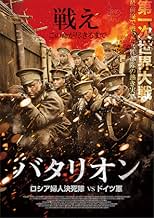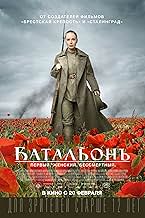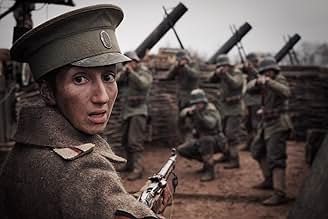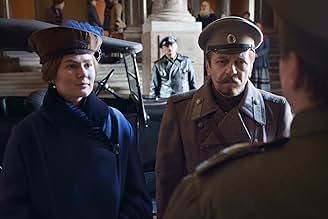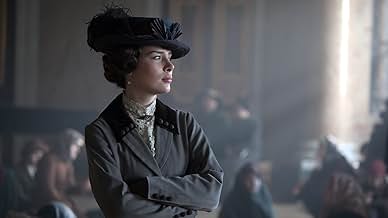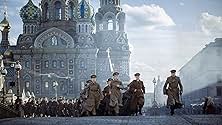IMDb RATING
6.4/10
1.8K
YOUR RATING
Russia, 1917, WWI. This is the story of the 1st Russian Women's Battalion of Death, formed as part of an ill-conceived propaganda ploy by the Russian Provisional Government in late May of 19... Read allRussia, 1917, WWI. This is the story of the 1st Russian Women's Battalion of Death, formed as part of an ill-conceived propaganda ploy by the Russian Provisional Government in late May of 1917.Russia, 1917, WWI. This is the story of the 1st Russian Women's Battalion of Death, formed as part of an ill-conceived propaganda ploy by the Russian Provisional Government in late May of 1917.
- Awards
- 18 wins & 11 nominations total
Featured reviews
I thought this movie was quite comedic in parts . . .mum arriving to take Nadya home etc
Nonsense. Looked ok but didn't appear realistic. In reality the main character was executed ages 30. The actor playing the role looked about 50.
The scenes on the obstacle course and the subsequent punching each other reminded me of a scene from Benny Hill.
Nonsense. Looked ok but didn't appear realistic. In reality the main character was executed ages 30. The actor playing the role looked about 50.
The scenes on the obstacle course and the subsequent punching each other reminded me of a scene from Benny Hill.
When I first saw this film, I realized this is the film about the the story in WW1 which is similar to the short film "Procelain Unicorn", I am not quite a fan of the war movies but based on the history, this movie is undoubtedly described what really happened in the history.
Firstly, the Russian army recruitment scene moves my heart and I deeply felt the desire of the Russian to win against German Army in the battle and this also describes the fighting spirit of the Russian people.
Also, there is a scene which two women hugged each other indicates that behind the war there is love.
It's 1917, and the First World War has been going on for three years. In Russia, the Tsar has been overthrown and the provisional government led by Kerensky has taken power. But the Russian Army is completely demoralized. The Communists aren't yet in power (that would await the second revolution) but "Soldiers' Committees" have been formed that have essentially taken command of entire battalions. Officers aren't obeyed and the soldiers are refusing to fight. All is chaos. The Kerensky government decides to "boost morale" by forming an all-women's battalion under the command of Maria Bochkareva. This movie tells their story.
I always appreciate a movie that fills me in on some history that I wasn't previously familiar with and I had never heard of this story before. Bochkareva's battalion became known as the "1st Women's Battalion of Death" and although there were several women's battalions formed after them, they were the first of only two to go into battle against the Germans. Now, as far as history is concerned - from what I've read since watching this I realize that there's a lot of dramatic licence taken with the story, but the portrayal of Bochkareva - a tough, no nonsense battalion commander who had served in the Russian Army since the outbreak of the war and who refused to allow the formation of a "Soldiers' Committee" in the battalion - by a Russian actress named Mariya Aronova seemed authentic enough and was compelling. Bochkareva believed - and Kernesky agreed - that an all womens' unit (of women willing to fight) would shame the men into doing their duty as well.
It takes a while for the women's battalion to see combat, but once combat is introduced, it's portrayed pretty well and there are a lot of graphic scenes. I will say that it's sometimes difficult to tell the Russians from the Germans - although in some ways I suppose that adds to the chaotic feeling that must be a part of any battlefield. The film is in Russian with well done English subtitles; there's no need to dub it. If I could compare this movie to something western audiences might be familiar with, it struck me as similar in tone and purpose to "Glory" - the story of the first black regiment in the Union Army during the US Civil War. (8/10)
I always appreciate a movie that fills me in on some history that I wasn't previously familiar with and I had never heard of this story before. Bochkareva's battalion became known as the "1st Women's Battalion of Death" and although there were several women's battalions formed after them, they were the first of only two to go into battle against the Germans. Now, as far as history is concerned - from what I've read since watching this I realize that there's a lot of dramatic licence taken with the story, but the portrayal of Bochkareva - a tough, no nonsense battalion commander who had served in the Russian Army since the outbreak of the war and who refused to allow the formation of a "Soldiers' Committee" in the battalion - by a Russian actress named Mariya Aronova seemed authentic enough and was compelling. Bochkareva believed - and Kernesky agreed - that an all womens' unit (of women willing to fight) would shame the men into doing their duty as well.
It takes a while for the women's battalion to see combat, but once combat is introduced, it's portrayed pretty well and there are a lot of graphic scenes. I will say that it's sometimes difficult to tell the Russians from the Germans - although in some ways I suppose that adds to the chaotic feeling that must be a part of any battlefield. The film is in Russian with well done English subtitles; there's no need to dub it. If I could compare this movie to something western audiences might be familiar with, it struck me as similar in tone and purpose to "Glory" - the story of the first black regiment in the Union Army during the US Civil War. (8/10)
Russia had already lost the war, and carrying on with it was pointless.
Does show how gruesome the war was, but fails to question the need to fight it.
Enemy soldiers in uniform are entitled to collect military intelligence and are not spies. To ignore a white flag is a war crime.
Maria Bochkareva got pardoned once, but urged US intervention to help the far-right and antisemitic Whites in Russia's Civil War. Saying she was 'seen as on the White side' is not a fair summation of this.
Came back to fight as part of their army, was captured and executed.
Does show how gruesome the war was, but fails to question the need to fight it.
Enemy soldiers in uniform are entitled to collect military intelligence and are not spies. To ignore a white flag is a war crime.
Maria Bochkareva got pardoned once, but urged US intervention to help the far-right and antisemitic Whites in Russia's Civil War. Saying she was 'seen as on the White side' is not a fair summation of this.
Came back to fight as part of their army, was captured and executed.
In 1917 Russia was at war – with Germany and itself. The troops at the front were war weary and being run by 'Soldiers Committees', the Tsar had been removed and the Provisional Government were fighting a losing battle for the hearts and minds of the people and the soldiers. So Minister of War, Alexander Kerensky, was charged with raising an all female combat unit. The first one was the '1st Russian Women's Battalion of Death' and it was raised and led by a feisty soldier who had already been decorated – fighting alongside men – this was Maria Bochareva.
She ruled with an iron fist and this is her story as told through the women who fought with her. They were one of only two units that were sent to combat and this film portrays what they did, the obstacles they had to overcome and the men they went to help.
Now history purists may take exception at some of the events here but the Kerensky Offensive (which they were in) is actually done fairly well. The acting is all rather good and the materiel seemed fine too. I have seen one review which called it 'modernist propaganda' but this is 'based' on facts. A full film on the real life of Maria Bochareva would have been a great idea too from the little I have read of her. The film portrays most of the women as being heroines though and she is not set at centre stage. This though is still a film very much worth the effort and as such I am happy to recommend.
She ruled with an iron fist and this is her story as told through the women who fought with her. They were one of only two units that were sent to combat and this film portrays what they did, the obstacles they had to overcome and the men they went to help.
Now history purists may take exception at some of the events here but the Kerensky Offensive (which they were in) is actually done fairly well. The acting is all rather good and the materiel seemed fine too. I have seen one review which called it 'modernist propaganda' but this is 'based' on facts. A full film on the real life of Maria Bochareva would have been a great idea too from the little I have read of her. The film portrays most of the women as being heroines though and she is not set at centre stage. This though is still a film very much worth the effort and as such I am happy to recommend.
Did you know
- TriviaThere is an expanded TV version of the film titled "Women's Battalion" (4 series). "Battalion's" producer Igor Ugolnikov is the second unit director of this version.
- ConnectionsReferenced in Evening Urgant: Igor Ugolnikov/Irina Rakhmanova (2015)
- How long is Battalion?Powered by Alexa
Details
- Release date
- Country of origin
- Official site
- Language
- Also known as
- The Battalion
- Filming locations
- Production companies
- See more company credits at IMDbPro
Box office
- Budget
- $10,000,000 (estimated)
- Gross worldwide
- $8,292,235
- Runtime
- 2h(120 min)
- Color
- Aspect ratio
- 2.35 : 1
Contribute to this page
Suggest an edit or add missing content


